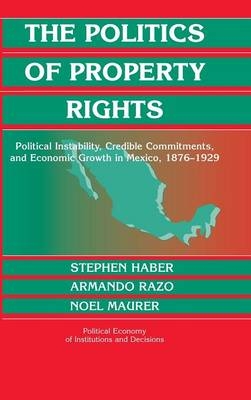
The Politics of Property Rights
Cambridge University Press (Verlag)
978-0-521-82067-7 (ISBN)
This book addresses a puzzle in political economy: why is it that political instability does not necessarily translate into economic stagnation or collapse? In order to address this puzzle, it advances a theory about property rights systems in many less developed countries. In this theory, governments do not have to enforce property rights as a public good. Instead, they may enforce property rights selectively (as a private good), and share the resulting rents with the group of asset holders who are integrated into the government. Focusing on Mexico, this book explains how the property rights system was constructed during the Porfirio Díaz dictatorship (1876–1911) and then explores how this property rights system either survived, or was reconstructed. The result is an analytic economic history of Mexico under both stability and instability, and a generalizable framework about the interaction of political and economic institutions.
Stephen Haber is A. A. and Jeanne Welch Milligan Professor at Stanford University, where he teaches political science and history. He is also the Peter and Helen Bing Senior Fellow of the Hoover Institution. Haber also serves as Director of Stanford's Social Science History Institute. He is the author of numerous books and articles, including Industry and Underdevelopment: The Industrialization of Mexico, 1890–1940 (1989) and How Latin America Fell Behind (1997). Armando Razo is a PhD candidate in the Department of Political Science at Stanford University. He has published articles in World Politics and the Journal of Latin American Studies. Professor Noel Maurer is Assistant Professor of Economics at ITAM. He has been a lecturer at Stanford University, and is the author of The Power and the Money: The Mexican Financial System, 1876–1931, as well as the author of articles for journals such as the Journal of Economic History and the Journal of Latin American Studies.
1. Introduction; 2. Theory: instability, credible commitments, and growth; 3. VPI coalitions in historical perspective: Mexico's turbulent politics, 1876–1929; 4. Finance; 5. Industry; 6. Petroleum; 7. Mining; 8. Agriculture; 9. Conclusion.
| Erscheint lt. Verlag | 26.5.2003 |
|---|---|
| Reihe/Serie | Political Economy of Institutions and Decisions |
| Zusatzinfo | 64 Tables, unspecified; 1 Maps; 5 Line drawings, unspecified |
| Verlagsort | Cambridge |
| Sprache | englisch |
| Maße | 152 x 229 mm |
| Gewicht | 770 g |
| Themenwelt | Geschichte ► Teilgebiete der Geschichte ► Wirtschaftsgeschichte |
| Sozialwissenschaften ► Politik / Verwaltung | |
| Wirtschaft ► Volkswirtschaftslehre | |
| ISBN-10 | 0-521-82067-7 / 0521820677 |
| ISBN-13 | 978-0-521-82067-7 / 9780521820677 |
| Zustand | Neuware |
| Haben Sie eine Frage zum Produkt? |
aus dem Bereich


